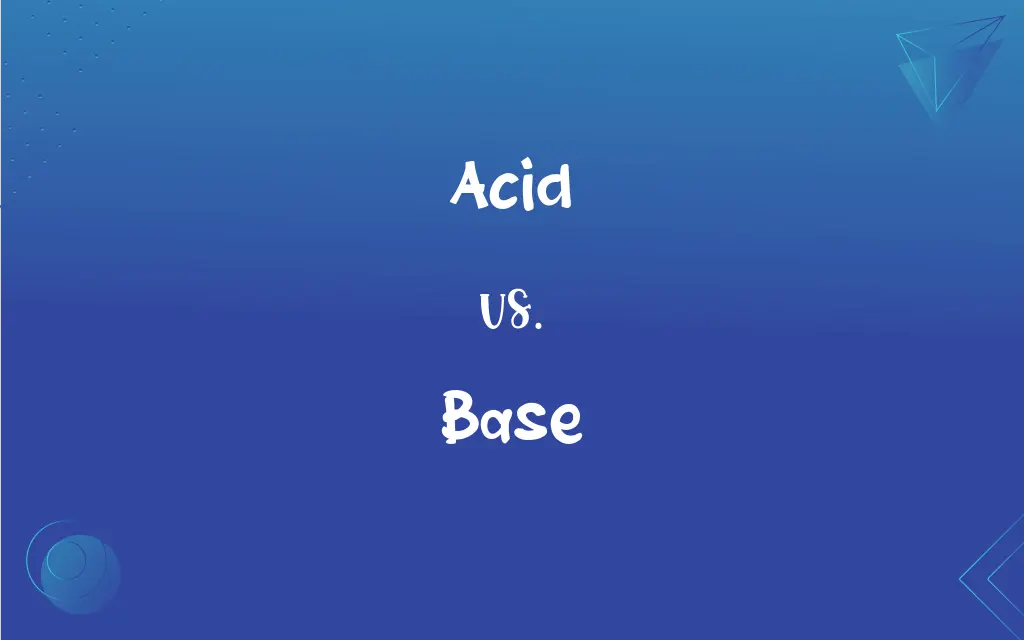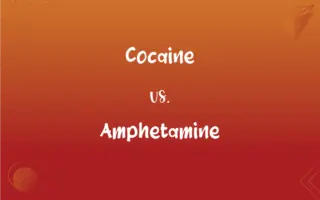Acid vs. Base: What's the Difference?
Edited by Aimie Carlson || By Harlon Moss || Updated on October 19, 2023
Acids are substances that donate protons (H+) and taste sour; bases accept protons and taste bitter.

Key Differences
Acids are substances that can donate a proton (hydrogen ion, H+) to another substance, making them proton donors. Bases, on the contrary, are substances that can accept a proton, classifying them as proton acceptors.
In terms of taste, acids typically have a sour flavor, which is why many citrus fruits like lemons and oranges taste tangy. Bases usually have a bitter taste and may feel slippery when touched.
When acids and bases react together, they neutralize each other, resulting in the formation of water and a salt. This reaction highlights their contrasting and balancing chemical behaviors.
On the pH scale, which measures the acidity or alkalinity of a solution, acids are found below a pH of 7, with 0 being the most acidic. Bases, conversely, are found above a pH of 7, with 14 being the most basic or alkaline.
When considering their impact on indicators like litmus paper, acids turn blue litmus paper red, indicating their acidic nature. Bases will turn red litmus paper blue, signifying their basic nature.
ADVERTISEMENT
Comparison Chart
Definition
Substances that donate protons (H+).
Substances that accept protons (H+).
Taste
Typically sour.
Generally bitter.
PH Value
Below 7.
Above 7.
Neutralization
React with bases to form salt and water.
React with acids to form salt and water.
Litmus Test
Turn blue litmus paper red.
Turn red litmus paper blue.
ADVERTISEMENT
Acid and Base Definitions
Acid
Acids have a pH value below 7.
Vinegar, which contains acetic acid, is acidic.
Base
Bases have a pH value above 7.
Ammonia solution is basic and has a pH greater than 7.
Acid
Acid is a substance that donates a proton.
Hydrochloric acid releases H+ ions in solution.
Base
Bases often taste bitter.
Soap, which is basic, has a distinct bitter taste.
Acid
Acids often have a tangy or sour flavor.
Citric acid gives lemons their sour taste.
Base
Base is a substance that can accept a proton.
Sodium hydroxide accepts H+ ions.
Acid
Acids can corrode some metals.
Sulfuric acid can react with zinc to produce hydrogen gas.
Base
Bases can feel slippery.
Soap feels slippery because it has a basic nature.
Acid
Acids turn blue litmus paper red.
When dipped in an acid, the litmus paper changes color.
Base
Bases turn red litmus paper blue.
A base will change the color of red litmus paper when tested.
Acid
Any of a class of substances whose aqueous solutions are characterized by a sour taste, the ability to turn blue litmus red, and the ability to react with bases and certain metals to form salts.
Base
The lowest or bottom part
The base of a cliff.
The base of a lamp.
Acid
A substance that yields hydrogen ions when dissolved in water.
Base
The part of a plant or animal organ that is nearest to its point of attachment.
FAQs
What's the main difference between acid and base?
Acids donate protons (H+), while bases accept them.
What happens when an acid reacts with a base?
They neutralize each other, forming water and salt.
Which is more acidic, a solution with pH 1 or pH 6?
A solution with pH 1 is more acidic.
What are some common household bases?
Ammonia and baking soda are common bases.
Do acids always have a pH below 7?
Yes, acids always have a pH below 7.
Can acids and bases be found in everyday products?
Yes, products like vinegar are acidic, and soap is basic.
How do bases usually taste?
Bases typically taste bitter.
How do acids respond to blue litmus paper?
Acids turn blue litmus paper red.
Can acids corrode metals?
Yes, many acids can corrode metals.
Are all bases slippery to touch?
Many bases feel slippery, but not necessarily all.
Can acids and bases be used in cooking?
Yes, acids like lemon juice and bases like baking soda are used in cooking.
Is water an acid or base?
Pure water is neutral with a pH of 7.
What's a common taste for acids?
Acids generally taste sour.
Is baking soda acidic or basic?
Baking soda is basic.
Are bases harmful to the skin?
Some concentrated bases can be caustic and harmful.
What are some examples of strong acids?
Examples include sulfuric acid and hydrochloric acid.
Are all acids dangerous?
While many are corrosive, not all acids are harmful in diluted or small quantities.
Is lemon juice an acid or base?
Lemon juice is acidic due to citric acid.
What pH value represents a neutral substance?
A pH of 7 represents neutrality.
What color does a base turn red litmus paper?
Bases turn red litmus paper blue.
About Author
Written by
Harlon MossHarlon is a seasoned quality moderator and accomplished content writer for Difference Wiki. An alumnus of the prestigious University of California, he earned his degree in Computer Science. Leveraging his academic background, Harlon brings a meticulous and informed perspective to his work, ensuring content accuracy and excellence.
Edited by
Aimie CarlsonAimie Carlson, holding a master's degree in English literature, is a fervent English language enthusiast. She lends her writing talents to Difference Wiki, a prominent website that specializes in comparisons, offering readers insightful analyses that both captivate and inform.































































